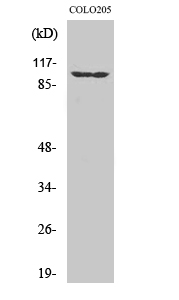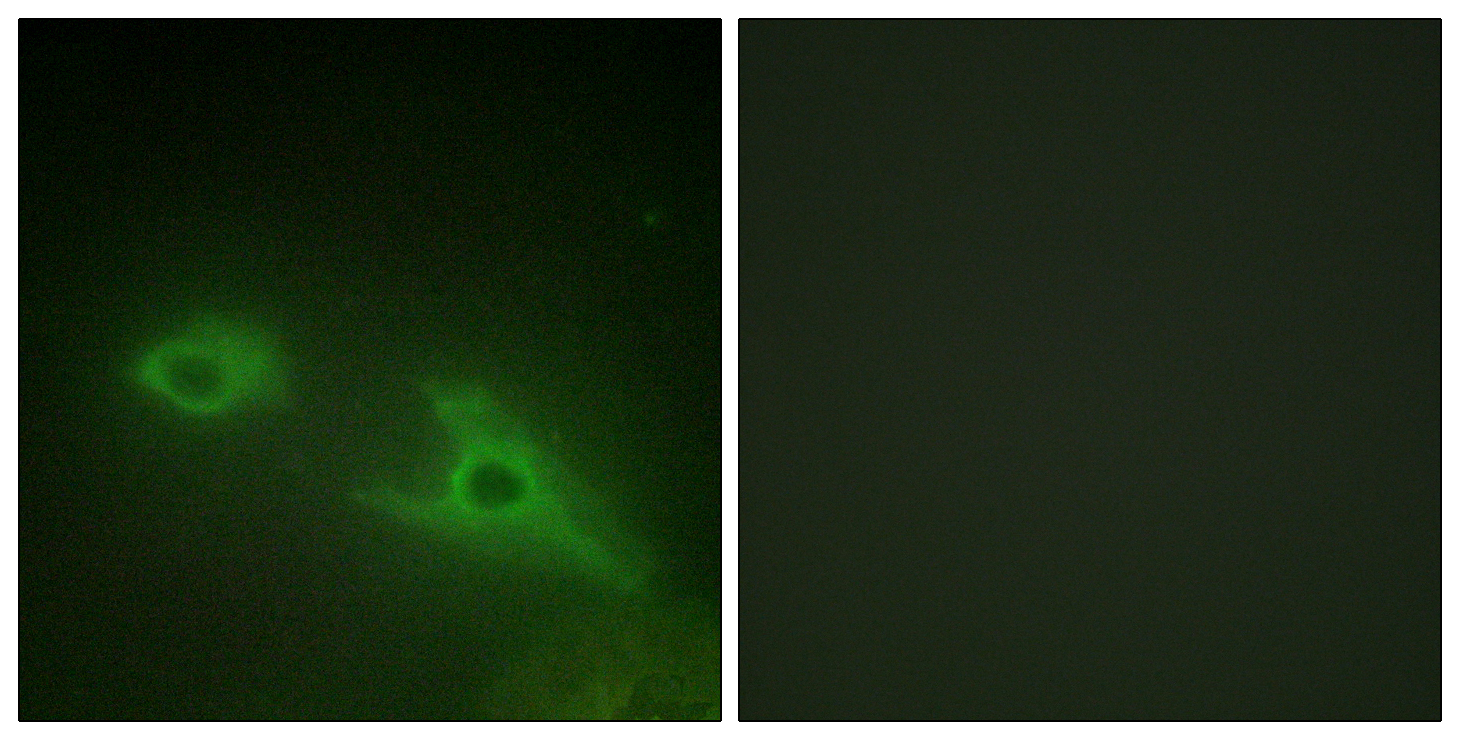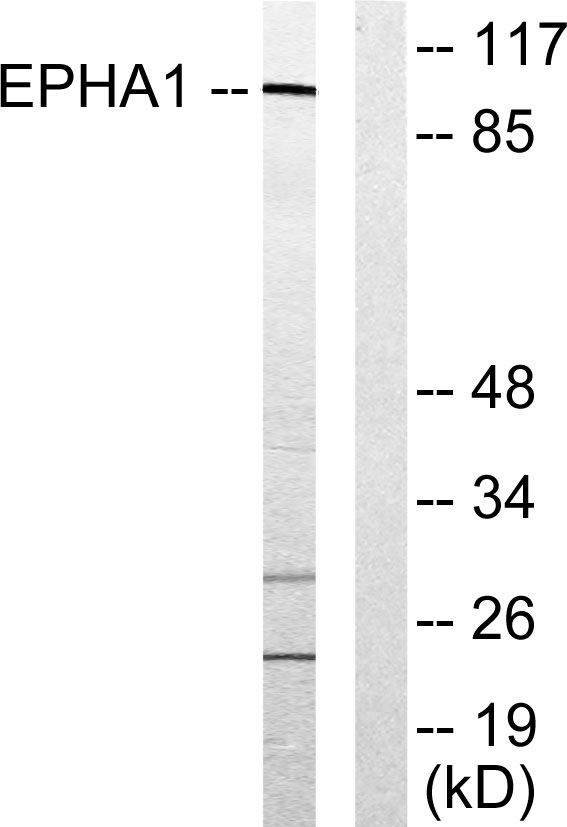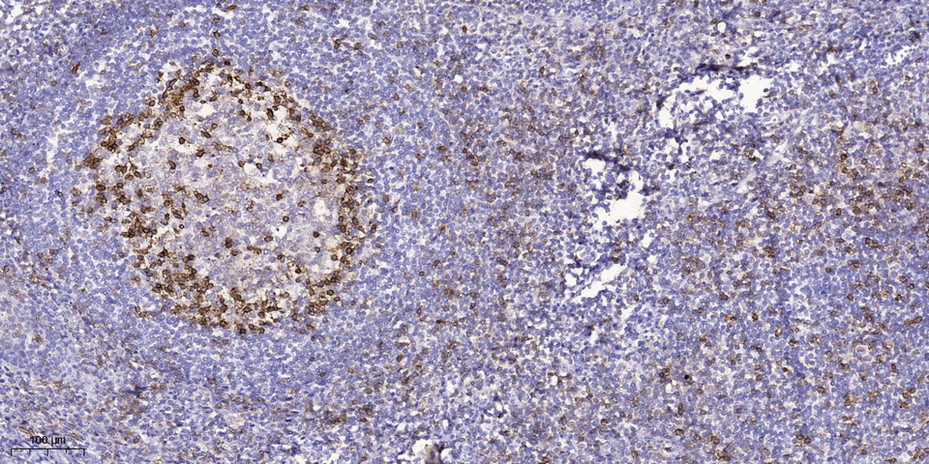EphA1 Polyclonal Antibody
- Catalog No.:YT1573
- Applications:WB;IHC;IF;ELISA
- Reactivity:Human;Mouse
- Target:
- EphA1
- Fields:
- >>Axon guidance
- Gene Name:
- EPHA1
- Protein Name:
- Ephrin type-A receptor 1
- Human Gene Id:
- 2041
- Human Swiss Prot No:
- P21709
- Mouse Swiss Prot No:
- Q60750
- Immunogen:
- The antiserum was produced against synthesized peptide derived from human EPHA1. AA range:541-590
- Specificity:
- EphA1 Polyclonal Antibody detects endogenous levels of EphA1 protein.
- Formulation:
- Liquid in PBS containing 50% glycerol, 0.5% BSA and 0.02% sodium azide.
- Source:
- Polyclonal, Rabbit,IgG
- Dilution:
- WB 1:500 - 1:2000. IHC 1:100 - 1:300. IF 1:200 - 1:1000. ELISA: 1:20000. Not yet tested in other applications.
- Purification:
- The antibody was affinity-purified from rabbit antiserum by affinity-chromatography using epitope-specific immunogen.
- Concentration:
- 1 mg/ml
- Storage Stability:
- -15°C to -25°C/1 year(Do not lower than -25°C)
- Other Name:
- EPHA1;EPH;EPHT;EPHT1;Ephrin type-A receptor 1;hEpha1;EPH tyrosine kinase;EPH tyrosine kinase 1;Erythropoietin-producing hepatoma receptor;Tyrosine-protein kinase receptor EPH
- Observed Band(KD):
- 108kD
- Background:
- This gene belongs to the ephrin receptor subfamily of the protein-tyrosine kinase family. EPH and EPH-related receptors have been implicated in mediating developmental events, particularly in the nervous system. Receptors in the EPH subfamily typically have a single kinase domain and an extracellular region containing a Cys-rich domain and 2 fibronectin type III repeats. The ephrin receptors are divided into 2 groups based on the similarity of their extracellular domain sequences and their affinities for binding ephrin-A and ephrin-B ligands. This gene is expressed in some human cancer cell lines and has been implicated in carcinogenesis. [provided by RefSeq, Jul 2008],
- Function:
- catalytic activity:ATP + a [protein]-L-tyrosine = ADP + a [protein]-L-tyrosine phosphate.,function:Receptor for members of the ephrin-A family. Binds with a low affinity to ephrin-A1.,similarity:Belongs to the protein kinase superfamily. Tyr protein kinase family.,similarity:Belongs to the protein kinase superfamily. Tyr protein kinase family. Ephrin receptor subfamily.,similarity:Contains 1 protein kinase domain.,similarity:Contains 1 SAM (sterile alpha motif) domain.,similarity:Contains 2 fibronectin type-III domains.,tissue specificity:Overexpressed in several carcinomas.,
- Subcellular Location:
- Cell membrane ; Single-pass type I membrane protein .
- Expression:
- Overexpressed in several carcinomas.
- June 19-2018
- WESTERN IMMUNOBLOTTING PROTOCOL
- June 19-2018
- IMMUNOHISTOCHEMISTRY-PARAFFIN PROTOCOL
- June 19-2018
- IMMUNOFLUORESCENCE PROTOCOL
- September 08-2020
- FLOW-CYTOMEYRT-PROTOCOL
- May 20-2022
- Cell-Based ELISA│解您多样本WB检测之困扰
- July 13-2018
- CELL-BASED-ELISA-PROTOCOL-FOR-ACETYL-PROTEIN
- July 13-2018
- CELL-BASED-ELISA-PROTOCOL-FOR-PHOSPHO-PROTEIN
- July 13-2018
- Antibody-FAQs
- Products Images

- Western Blot analysis of various cells using EphA1 Polyclonal Antibody

- Immunofluorescence analysis of HeLa cells, using EPHA1 Antibody. The picture on the right is blocked with the synthesized peptide.

- Western blot analysis of lysates from COLO205 cells, using EPHA1 Antibody. The lane on the right is blocked with the synthesized peptide.

- Immunohistochemical analysis of paraffin-embedded human tonsil. 1, Antibody was diluted at 1:200(4° overnight). 2, Tris-EDTA,pH9.0 was used for antigen retrieval. 3,Secondary antibody was diluted at 1:200(room temperature, 45min).



